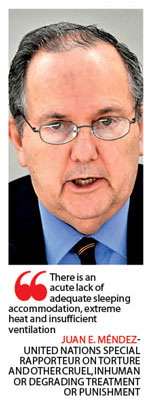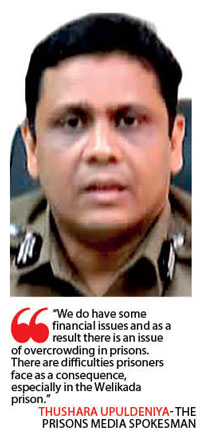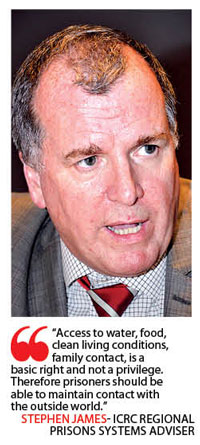Reply To:
Name - Reply Comment
Such a strategy would assist in exposing the positive and negative versions upheld by society, of life within prison walls
 From time immemorial places of detention have been regarded with much skepticism as they were invariably associated with clandestine acts of human rights violation. Though Prisons authorities claim that the present condition was favourable, investigations carried out by the UN Special Rapporteur reveal that the conditions were horrific and reprehensible. At the 3rd Asia Pacific Regional Correctional Managers’ Conference held in Sri Lanka recently the Minister of Prisons Reforms, D.M. Swaminathan revealed that our prison system was going through reforms and he exhibited his enthusiasm in adhering to international standards such as the Mandela Rule (revised UN standard minimal rules) and the humanitarian requirements prescribed by the ICRC. The ICRC maintains the view that deprivation of liberty was the sole punishment for prisoners and that no further punishment could be administered.
From time immemorial places of detention have been regarded with much skepticism as they were invariably associated with clandestine acts of human rights violation. Though Prisons authorities claim that the present condition was favourable, investigations carried out by the UN Special Rapporteur reveal that the conditions were horrific and reprehensible. At the 3rd Asia Pacific Regional Correctional Managers’ Conference held in Sri Lanka recently the Minister of Prisons Reforms, D.M. Swaminathan revealed that our prison system was going through reforms and he exhibited his enthusiasm in adhering to international standards such as the Mandela Rule (revised UN standard minimal rules) and the humanitarian requirements prescribed by the ICRC. The ICRC maintains the view that deprivation of liberty was the sole punishment for prisoners and that no further punishment could be administered.
Hence conditions in prisons should be compatible with what they would have received outside.
However, the Daily Mirror learnt that our prisons were exceedingly overcrowded and congested and that prisoners were forced to endure inhumane conditions, that certain inmates were too impoverished to pay the fine or bail that they were remanded for a lengthy period which resulted in further overcrowding, that there was an acute lack of infrastructure, that there was political favouritism, contraband entering prisons, that there was no pragmatic mechanism to address complaints and that prison procedures did not facilitate family visits. Speaking to the Daily Mirror the Prisons Media Spokesman elaborated on the conditions of Sri Lankan prisons while the ICRC spokesman explained the standard minimal rules for the treatment of prisoners. The statement made by the UN rapporteur manifests that Sri Lanka did not, as of yet, completely adhere to International protocols and standards.
 ‘detainees suffer from inhumane detention conditions’
‘detainees suffer from inhumane detention conditions’
Expressing his concern over the conditions of life in prisons Juan E. Méndez, the Special Rapporteur after a ten-day visit to Sri Lanka remarked at a press conference, “All are characterized by a very deficient infrastructure and pronounced overcrowding. As a result, there is an acute lack of adequate sleeping accommodation, extreme heat and insufficient ventilation. Overpopulation also results in limited access to medical treatment, recreational activities or educational opportunities.” He added that these conditions combined resulted in a form of cruel, inhuman and degrading treatment.
“TID detainees also suffer from inhumane detention conditions, including excessive heat, absence of ventilation, limited access to daylight and exercise, prolonged or indefinite isolation in some cases, and lack of electricity so that some of them spend about 12 hours a day in the dark,” he added.
“During my visit I observed levels of population exceeding capacity by well over 200 or 300 per cent,” he said. Citing the Vavuniya Remand Prison as a striking example of overcrowding he noted, “One of its halls hosted 170 prisoners in what my team and I estimated to measure less than 100 square metres, providing less than 0.6 metres per person. In the same building, other prisoners were forced to sleep on the staircase for lack of space in the detention areas. In addition, we saw cells designed for one person occupied by four or five inmates.”
“The larger prisons in Colombo were built in the mid-19th century and walls, roofs and staircases are literally crumbling on the prisoners. The Government has indicated that Welikada prison would be closed and a new prison would be built in Tangalle, but we understand the latter is not even in the planning stages yet,” he pointed out. He added that while replacement of old prisons was a good idea it was also urgent to conduct maintenance and repair the unsafe conditions that amounted to cruel, inhuman and degrading treatment or punishment.
“The congested prisons are a direct result of lengthy sentences for non-violent and drug related offences. Suspects are subjected to lengthy remand periods with many being detained for years and some even up to ten to 15 years,” he said. He urged Sri Lanka to consider measures to make more non-violent offences bailable and to experiment with alternatives to incarceration.
“Relative to the conditions of detention for men, the female wards of Welikada prison and Vavuniya Remand Prison showed conditions that were better and more humane,” he added. With regard to the treatment of prisoners by staff in penitentiaries and remand prisons he noted that in conducting his interviews he did not receive any serious complaints.
He said that family visits took place once a month for the convicted, and once a week for remand inmates, but in reality since many relatives lived far away they visited infrequently. “The prison authorities should install phones so that inmates can communicate with their families. Even when longer visit time is officially granted (i.e. one hour) the bureaucratic and security requirements of the visit (body search, security screening, documentation and registry of the visit, etc.) are counted within that allocated period, reducing the actual visit time to a few minutes. Particularly in PTA cases, an extra burden is put on visitors including undressing for highly intrusive and demeaning body searches.”
He claimed that in the prison system there was no formal complaint mechanism available to inmates. “The only effective avenues for complaints are through the NHRC, and the possibility of filing a “fundamental rights” case before the Supreme Court.”
Referring to the monitoring of prisoners he said, “Prisons and detention centres are visited by the International Committee of the Red Cross, a Visiting Committee and NHRC, as well as by some very credible non-governmental organizations. But a national preventive mechanism as contemplated in OPCAT( Optional Protocol to the Convention against Torture) would provide for scheduled and unannounced visits by a national authority as well as by the Subcommittee on the Prevention of Torture (SPT), a very credible and professional international treaty body.”
 ‘Only criminals should be imprisoned’
‘Only criminals should be imprisoned’
Thushara Upuldeniya, the Prisons Media Spokesperson said that the condition of Sri Lankan prisons was agreeable especially in comparison with the overly overcrowded prisons in Bangladesh, Thailand and India . “We do have some financial issues and as a result there is an issue of overcrowding in prisons. There are difficulties prisoners face as a consequence, especially in the Welikada prison. This is why we have proposed to relocate the Welikada prison. But as a whole considering all prisons island wide the rate of overcrowding has reduced in the past 5 years because of the urban relocation programme.”
“There are many cases where the culprit has been unable to pay the fine or the bail due to poverty, and are continuously remanded,” he added elaborating on the reasons for prison overcrowding.
“Most developed countries and countries with effective criminal justice systems have alternatives for imprisonment and we have proposed them too. Only criminals should be imprisoned. Drug addicts, for instance, should not be imprisoned as drug addiction is not a crime. Hence they are sent to drug rehabilitation camps,” he said. He also stated that through community based rehabilitation overcrowding was reduced and within the next few years this issue would be resolved. He said that drugs and mobile phones were the main items of contraband which have raised concern among prison officials at present. “Contraband items is a major issue we have been facing and last year we imported high tech machines such as body scanners and parcel scanners as manual screening did not produce sufficient and effective results. As a result we have seen a reduction in the inflow of contraband items in the last six months. We also signed an agreement with the police department to use police dogs to detect the use of drugs in prisons.”
When asked about favouritism in prisons he said “Every prisoner has to be examined after admission and it is the right of every prisoner to consult a doctor. Doctors have the authority to command a prisoner be admitted to the Prison hospital or to a hospital outside the compound. Prison officials cannot challenge the doctor’s decision. This is what happens when politicians are imprisoned.”
Referring to the standard of food provided he said, “Everything is prescribed in the Prison Standing Order. It is a law and we cannot go against it. Accordingly we can neither change the weight nor the variety of ration portions.”
When asked if torture was still practised within prisons Upuldeniya said that there had not been a single case related to torture reported in the past few years. He also added that there was an effective classification system where prisoners were classified according to gender, age, behaviour and the risk prisoners posed to security.
He also noted that there was an effective mechanism in place if any prisoner wanted to complain against a prison official. “They can complain either to the Commissioner for prisoners or to the human rights commission.” He further asserted that there was a mutual understanding between the staff and prisoners.
“International organizations such as the ICRC can visit and evaluate our prisons even without the assistance of our officers. They look into the health of prisoners, conditions of prisons and compile a report which is submitted to the superintendent and the commissioner. Further there is an independent intervention conducted by the Visiting Committee appointed by the Minister for Prison Reforms. They can review our prisons at any time and submit reports to the Minister. Prisoners are also able to make complaints to these independent visitors. In addition we have prisoner welfare associations for each prison,” he added claiming that the country’s prison system was transparent.
 ‘You need to realize that prison is expensive’
‘You need to realize that prison is expensive’
Speaking to the Daily Mirror Stephen James, the ICRC Regional Prisons Systems Advisor said that effective classification systems which were lacking in many countries were essential to protect vulnerable prisoners such as the disabled, the elderly, women and children. “If you have low level offenders in the same prison as high security detainees, then they will be exposed to radicalization. If prisoners were diverted away from a high security prison setting into a lesser restrictive setting, then this will separate them from the hard core criminal elements.”
“There has been a tendency in prisons to classify groups of prisoners on the length of sentence or the crime that they committed. Within the Mandela rules, classification talks about individual’s needs and how they could be successfully integrated first of all into the prison system,” he noted.
Reflecting on the issue of contraband entering prisons he said, “The authorities could opt for expensive technological requirements like X-ray machines and body scanners or promote a professional proactive relationship between staff and prisoners through which it could be stopped. The latter is a low cost option that has proven to work in many countries of the world and it is academically proven to be one of the greatest assets in security in any prison of the world. The most sophisticated security equipment in the world can’t replace personal interaction between human beings.”
“Access to water, food, clean living conditions, family contact, is a basic right and not a privilege. Therefore prisoners should be able to maintain contact with the outside world. This should be facilitated by authorities through visits, letters, telephone calls etc,” he said referring to the necessity of promoting and permitting interaction with the outside world. He also added that there were correctional systems which allowed prisoners to access skype.
Speaking about children living in prisons with their imprisoned mothers he advocated that if a prison authority had decided to house children of prisoners of any age, the children should not be treated as prisoners and that they should be provided with facilities compatible with what they would have received outside in society. “They should be provided schooling, nursery care, and they should be located in areas where they are protected from other prisoner groups.”
He further stated that custody was not the only option available and that there were other criminal sanctions that could be imposed at little or no cost. He added that the main alternative for overcrowding was diversion from custody. “You can divert women, children, first time offenders especially those who are in prisons for minor offences. Alternatives could be bail, community sanctions etc. If it is at a pre-trial phase then it could be production at the police station on a daily basis, surrender of passports etc.”
“You need to realize that prison is expensive. If society wants to send every offender to prison, then they have a duty of care and they must fund prisons appropriately. Society needs to accept that large portions of criminal offences could be dealt with alternative sanctions, and that it could save a lot of money which could be used elsewhere for infrastructure etc.” he added. He also expressed that societal thinking should shift from a punitive system where everybody, despite the severity of the crime, was sent to prison.
He emphasized that prisons could be more transparent by implementing Mandela rules in the areas of oversight and inspection. “This includes both oversight by responsible government agencies and also external oversight by international organizations such as the ICRC and/or the other international, national organizations and human rights groups. This is a protective mechanism both for prisoners and for the authorities.”
“Historically people associate places of detention with ill treatment and torture. This thinking has prevailed for hundreds of years. If society groups or oversight mechanisms enter prisons they’ll realize that prisons are not as bad as how society claims they are to be as they’ve implemented large portions of international standards. So why not open up and be more transparent?” he questioned.